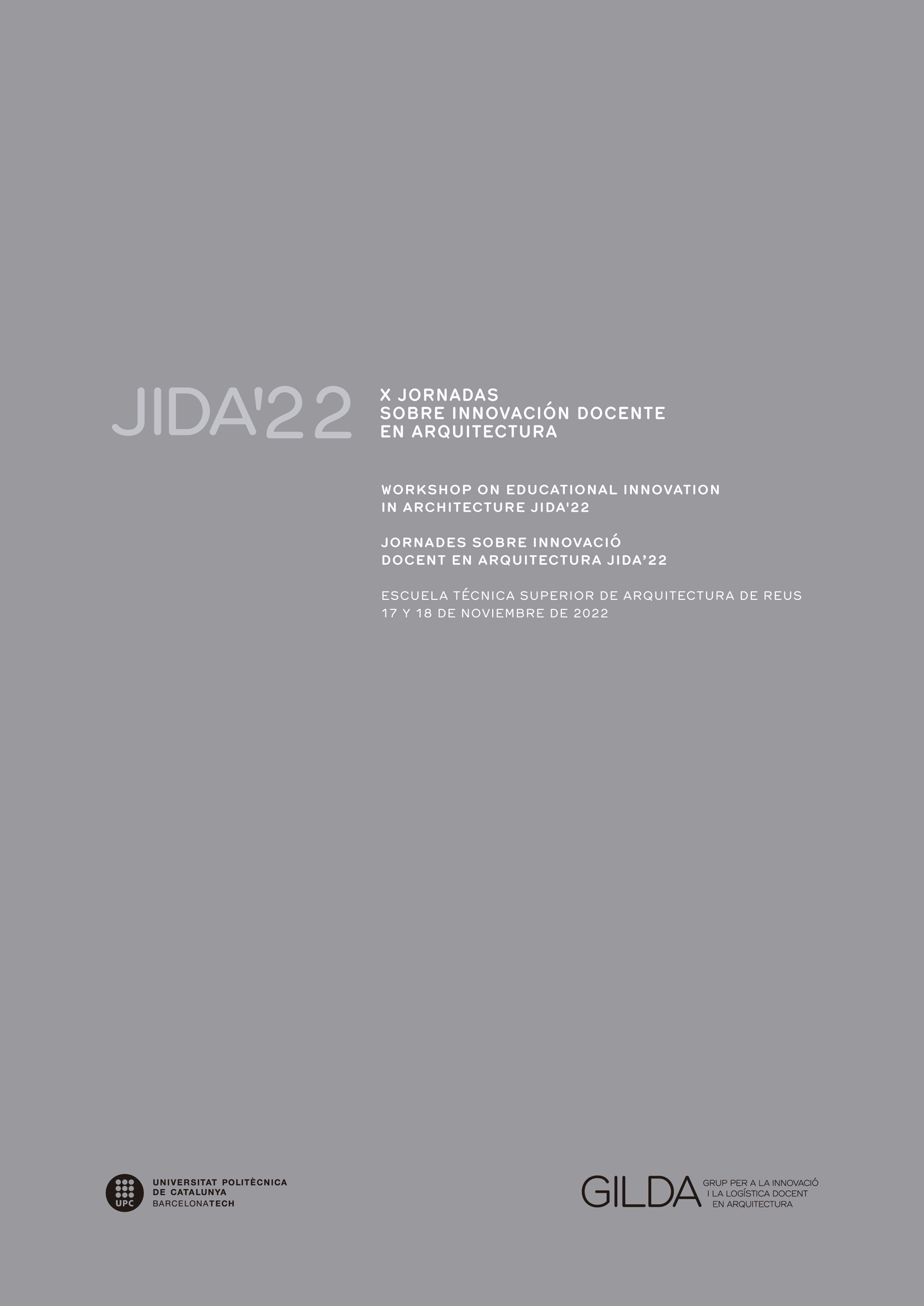A learning master's degree experience based on a project at the service of the community
DOI:
https://doi.org/10.5821/jida.2022.11552Keywords:
master’s degree, service learning, collaboratibe learnig, virtual classroom, project-based learningAbstract
This learning experience was developed on a spring semester course during the academic year 2020-21, in the framework of an architectural master’s programme, and was propitiated by the competition of various opportunities that have facilitated the triggering of a learning process that has simultaneously incorporated aspects of SL (service learning), VC (virtual classroom), CL (collaborative learning) and PBL (project-based learning). The focus of the experience was to redesign the hall of an academic institution and therefore started from the premise of recreating an identity and exhibition space in an educational building. The experience does not arise from a conscious reflective process, but rather the result of a timely demand that allowed linking innovative teaching aspects that had been shot previously. This experience has been developed in a very limited temporal and spatial context, propitiated by COVID19, but it has potentially scalable aspects to be repeated in other less exceptional circumstances.
References
AZORÍN ABELLÁN, C.M. (2018). El método de aprendizaje cooperativo y su aplicación en las aulas, Perfiles Educativos. vol. 40 (161), pp.181-195. <https://doi.org/10.22201/iisue.24486167e.2018.161.58622> [Consulta: 18 de septiembre de 2022]
B.O.E. (2007). Real Decreto 1393/2007, de 29 de octubre, por el que se establece la ordenación de las enseñanzas universitarias oficiales. <https://www.boe.es/eli/es/rd/2007/10/29/1393/con> [Consulta: 18 de septiembre de 2022]
CÁNOVAS ALCARAZ, A., FELIZ RICOY, S., y MARTÍN TAIBO, L. (2019). Mediación entre diseño y sociedad: aprendizaje y servicio en Producto Fresco 2019. In VII Jornadas sobre Innovación Docente en Arquitectura (JIDA'19), Escuela Técnica Superior de Arquitectura de Madrid, 14 y 15 de Noviembre de 2019: libro de actas, pp. 145-156. Universitat Politècnica de Catalunya. Iniciativa Digital Politècnica. <http://hdl.handle.net/2117/171519> [Consulta: 18 de septiembre de 2022]
JOHNSON, D.W., y JOHNSON, R.T. (1990). Cooperative learning and achievement. In S. Sharan (Ed.), Cooperative learning: Theory and research, pp. 23-37. Praeger Publishers. <https://psycnet.apa.org/record/1990-97501-002> [Consulta: 18 de septiembre de 2022]
ESPINOSA PÉREZ, E., RIBOT MANZANO, A., DE ABAJO CASTRILLO, B., y ALTUNA CHARTERINA, G. (2017). Tácticas proyectuales colaborativas. In V Jornadas sobre Innovación Docente en Arquitectura (JIDA'17), Escuela Técnica Superior de Arquitectura de Sevilla, 16 y 17 de Noviembre de 2017: libro de actas, pp. 218-230. Universitat Politècnica de Catalunya. Iniciativa Digital Politècnica. <https://doi.org/10.5821/jida.2017.5231> [Consulta: 18 de septiembre de 2022]
GARCÍA TRIVIÑO, F., LÓPEZ UJAQUE, J.M., SORIANO PELÁEZ, F., y URZÁIZ GONZÁLEZ, P. (2014). Trabajar con desconocidos. In II Jornadas sobre Innovación Docente en Arquitectura (JIDA’14), Escuela Técnica Superior de Arquitectura de Barcelona, 28 y 29 de Abril de 2014, pp. 43-53. <http://hdl.handle.net/2099/14620> [Consulta: 18 de septiembre de 2022]
HERNÁNDEZ FALAGÁN, D. (2020). Pedagogía colaborativa y redes sociales: diseñar en cuarentena. In VIII Jornadas sobre Innovación Docente en Arquitectura (JIDA'20), Escuela Técnica Superior de Arquitectura de Málaga, 12 y 13 de Noviembre de 2020: libro de actas, pp. 186-197. <http://hdl.handle.net/2117/331298> [Consulta: 18 de septiembre de 2022]
JOHNSON, D.W., y JOHNSON, R.T. (1999). El aprendizaje coperativo en el aula. Buenos Aires. Paidós.
JOHNSON, D.W., y JOHNSON, R.T. (2015). La evaluación en el aprendizaje cooperativo. Ediciones SM España.
LAAL, M., y GHODSI, S.M. (2012). Benefits of collaborative learning. Procedia-social and behavioral sciences, 31, 486-490. ISSN 1877-0428,<https://doi.org/10.1016/j.sbspro.2011.12.091>[Consulta: 18 de septiembre de 2022]
MUIR, T., y RANCE, B. (Eds) (1995). Collaborative Practice in the Built Environment. Red Wheel/Weiser
PUJOLÀS MASET, P. (2009). El aprendizaje cooperative, 9 ideas clave. Graó
PRENSKY, M.R. (2010). Teaching Digital Natives: Partnering for Real Learning. Corwin-Sage press.
RODRÍGUEZ SÁNCHEZ, J. (2015). Ambientes de aprendizaje colaborativo en comunidades artísticopedagógicas. Tesis Doctoral. Universidad Complutense de Madrid. Facultad de Educación. Departamento de Métodos de investigación y diagnóstico en educación. <https://eprints.ucm.es/id/eprint/33063/>[Consulta: 18 de septiembre de 2022]
SIBBET, D. (2010). Visual meetings: How graphics, sticky notes and idea mapping can transform group productivity. London: John Wiley & Sons.
VILA I GARRIGA, A. (2010). La Murga, 10 años rehabilitando pisos en Ciutat Vella. Prácticas de ciudadanía: diez experiencias de aprendizaje servicio (pp. 172-183). Octaedro.
WOJTOWICZ, J. (1995). Virtual design studio (Vol. 1). Hong Kong University Press.
SMITH, B. L., y MACGREGOR, J. T. (1992). What is collaborative learning.
VIDEO (2021) <https://drive.google.com/file/d/1sezXJBl8ZqPqf1xXwTuE6CllOM2CPSYD/view?usp=sharing> [Consulta: 18 de septiembre de 2022]






















